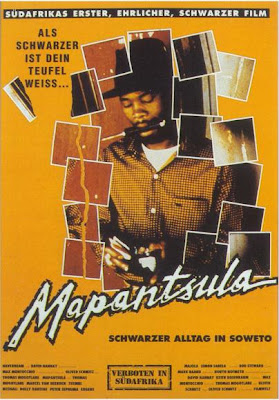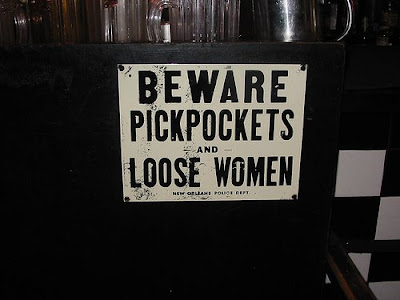Mapantsula (Hustler)
 I first saw this movie during African Politics in Film class; I was devastated by the end and snuck out of class to cry. Actually, I have a list of movies that made me cry, some of which ended up on this list. Several years later, watching this film had brought less tears, but it's message was no less important, even as the subject of it's protestation ended over a decade ago.
I first saw this movie during African Politics in Film class; I was devastated by the end and snuck out of class to cry. Actually, I have a list of movies that made me cry, some of which ended up on this list. Several years later, watching this film had brought less tears, but it's message was no less important, even as the subject of it's protestation ended over a decade ago. Mapantsula, which is Hustler in the Bantu language, is an anti-apartheid film from 1988 co-written/directed by Oliver Schmidtz and Thomas Mogotlane, and starring Mogotlane in the title role (he would later be the assistant director for a better-known South African film, Sarafina!). Oddly enough, when I googled Mr. Mogotlane, I saw in some places he was billed only as the main actor, while in other places he was credited as director and star. I believe that has to do with the times; Mapantsula was made under the pretense of being a common gangster flick, so was permitted to be filmed in the South African townships of Soweto and Johannesburg. Billed as anti-apartheid movie "made by the people, for the people" thus drawing comparisons to Sweet Sweetback's Baadasssss Song, it was the first such film made entirely in South Africa, and was initially banned there, but later garnered seven major film awards in that country. The fact of the matter is, there is a fragmented smattering of info concerning the production of this film, so if anyone wishes to contribute, feel free to do so.
What I will remark more about is the plot. The story centers on Panic (Mogotlane), a petty thief who has to decide between survival and personal gain, or supporting his cellmates, freedom fighters against the Apartheid government. In flashbacks, we see that Panic robs white passerbys of downtown Johannesburg by day, then bullies rival criminals at night and tries to stay one step ahead of his landlady, all the while mooching off his put-upon girlfriend Pat (Themba Mtshali), who herself is trying to maintain employment despite his plotting and intrusions. In the present, Panic is run through an elaborate system of manipulation and cruelty by the local authorities, bent on convicting the militant protesters he has been locked up with by chance. His past and present eventually merge in a series of events; including Pat leaving him for Duma (Peter Sephuma), a freedom fighter, who along with the landlady's son Sam, is organizing a rent strike and mass protest. While Panic is hunting down Duma, he is told that Sam is missing, so he instead searches for the missing boy. Panic confronts Duma, but both are soon running for their lives as they are being tailed by government agents. They make an agreement to help each other, but before long they are swept into the protest as the landlady confronts the police sent to disperse and arrest the protesters. The next series of events mirror the struggle in Panic's mind as he is forced to decide whether to help the government or his countrymen.
It is this climax in the film that first brought me to tears. The mother, distraught over her missing son, is escorted by the two men with an uneasy truce who set aside their own agendas for her sake. The moment of Panic's epiphany is tense and dignified without melodrama. One can argue that Panic's life until then makes it hard to sympathize with him, as he seemed to run against the current of the film's premise. But it's precisely this defiance that redeems his character in the end. One can only speculate what happens to anyone after that, but it's a great moment to build up to, and in it's quiet way it hits home.
If you're interested in seeing this movie, this is where it can be ordered. It's currently only available on VHS, but perhaps in the near future and with more visibility and interest, it can be produced for DVD (and thus Netflixed).


Comments